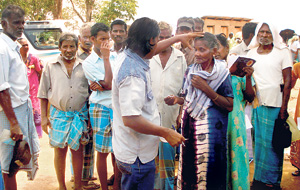It’s a strange sight………..it’s not a hospital, not even a clinic, but a woman from a cadjan-thatched home is seated six metres from a vision chart out in the open to undergo an eye test, with a knot of inquisitive onlookers around her.
This is part of an accelerated programme to provide primary eye care, an urgent need among the internally displaced persons in Vavuniya, the Sunday Times learns.
With the objective of implementing the Vision 20-20 programme which aims to prevent avoidable blindness in any population including those displaced, two high-level eye teams visited the camps to set in motion several measures, explained Deputy Director-General of Public Health, Dr. Palitha Mahipala, of the Ministry of Health.
The first priority was to gauge the gravity of eye care issues in the camps and screening was at the top of the list, he said.
Headed by Consultant Ophthalmologist Dr. Mangala Gamage of the Eye Hospital in Colombo, a 20-member team comprising several more doctors, nurses, ophthalmic technicians and also officers from the Vision 20-20 Secretariat screened 1,700 people within two days. The second team of 25 members, headed by Consultant Ophthalmologist Dr. Saman Senanayake of the Kandy General Hospital screened 1,500, it is learnt.
There was a high prevalence of conjunctivitis among those screened, as well as other eye infections which needed immediate treatment, said Dr. Gamage adding that among the chronic conditions diagnosed by the team bi-lateral cataracts (in both) eyes were evident in a large number while refractive errors were also detected both in young children as well as adults. “Most adults need reading glasses,” she said.
The patients who were treated for infections by the first team were reviewed by the second, she added, and follow-up will be continued by the teams which are due to go to the camps. Stressing that cataracts should be operated soon, Dr. Gamage said a small sterile theatre is the need of the hour.
Good surgery and proper lenses will make the need for follow-up visits after the cataract surgery minimal,” she said, adding that gradually other problems such as squints, defects and glaucoma could be dealt with.
While Dr. Gamage urged that a stream of eye teams should keep visiting the camps, Dr. Mahipala assured that trained eye doctors would go there on a roster-basis every other week. Two screening programmes and logistics to train health volunteers will be funded by Standard Chartered Bank through Sight Savers International, with a donation of US $ 5,000.
“This is an interim measure,” he said, detailing the action planned for the displaced men, women and children. The medical teams will treat acute eye conditions immediately as otherwise these patients, at the moment, have to go to the Vavuniya General Hospital where there is an Eye Surgeon and an equipped low vision unit set up with assistance from Vision 20-20 and Sightsavers, a non-governmental organization.
However, as the Vavuniya Hospital is 20 miles away, the Health Ministry is providing facilities to the Chettikulam Base Hospital, which is just three miles from the camps, to set up an eye unit. “An operating theatre is under construction by the German Red Cross with equipment promised by IRIS and Sightsavers. It should begin functioning within the next two months,” said Dr. Mahipala.
Explaining that as there were no Eye Surgeons at Kilinochchi or Mullaitivu, people who were living in those areas have had no proper eye care for 20 years, he said. One of the biggest problems seems to be mature cataracts, a chronic ailment that needs intervention and lens implants soon to prevent blindness. Refractive errors and low vision were also detected as part of the chronic ailments. While a whole range of low-vision devices such as magnifying glasses have already been provided, spectacles to correct refractive errors are to be supplied by the International Centre for Eyecare Education.
The focal point for cataracts, Consultant Ophthalmologist Dr. Champa Banagala, is in the process of identifying a location at the Chettikulam Hospital or even within the camp area to set up a field operating theatre where the cataract operations could be carried out, he said, adding that the College of Ophthalmologists is also extending its full support.
Referring to the primary eye care programme, the DDG said that midwives and volunteers from among the displaced have been identified, trained, with the support of the Health Education Bureau Director Dr. Sarath Amunugama, and mobilized to fan out across the camps in all the zones – 0, 1, 2, 3 and 4.
Armed with primary eye care kits including vision charts, they will visit each and every household, tackling minor ailments then and there at ground level.
Those people with acute eye problems they will refer to the public health centres located in each zone, with a referral hospital in each zone as the hub. Those with chronic problems will be referred to the visiting teams of doctors, he said.
Five hundred volunteers have already been trained, with another 300 and many more awaiting training.
A drop in the ocean, many will think, when considering the nearly 300,000 displaced people in the camps, but a start has been made and the most vital consideration is the ripple effect.
How you can help
You can prevent a person from going blind by contributing towards the cost of a lens for cataract surgery, the chronic eye ailment prevalent among a large number of displaced people.
For more information, please contact the Vision 2020 Secretariat, Health Ministry, Dean’s Road, Colombo 10. Phone: 011-5741815 or 011-2674682; fax: 011-2690035; e-mail: vision2020@health.gov.lk. The contact person is Dr. Asela Abeydeera. |

